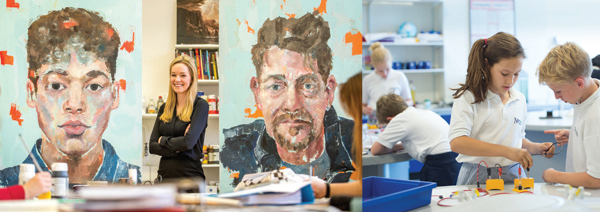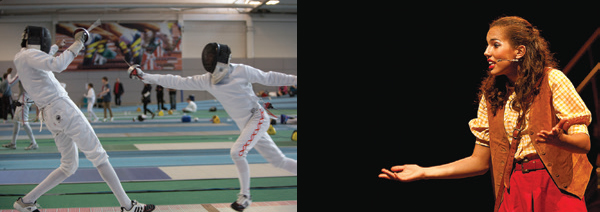Menu
How to choose a school for you child?
FITS AND STARTS – Parents living in Nappy Valley have a wide range of schools to choose from but the challenge is to find the one that fits your child perfectly, says Gillian Upton.
 Ardingly College, Newton Prep
Ardingly College, Newton PrepA child’s time at school should be a positive, nurturing and beneficial experience, setting them up for their adult life. Both private and state schools in Nappy Valley provide a rich seam to tap into judging by the number rated good and outstanding by the various inspection bodies.
However, issues such as exam anxiety, cyber bullying, new-style exams to grapple with from next year, and a continued focus on STEM subjects precluding creativity are hovering just below the surface. These, plus the overriding issue of getting your child into the right school in the first place, occupy the thoughts of parents wanting to do the right thing by their children.
To say education is a hot potato is an understatement, not helped by the musical chairs at Westminster over the role of Education Secretary. It’s too soon to say how Justine Greening will fair under new PM Theresa May, but her predecessor Nicky Morgan was less antagonistic than the much derided Michael Gove, who was seen as the scourge of teachers and the liberal left.
Gove’s legacy means that any child taking GCSEs in 2017 will be a guinea pig for his new-style maths and English exams and one can only hope that sixth form colleges and senior schools will make an accommodation for what are far more challenging tests (read the feature on all the changes in our education system here).
Increasingly demanding curriculums and busy exam periods feed into the burgeoning private tutoring industry, something Max Blanshard, Founder of TutorMapper, is only too aware. “Each year,” he says, “as the exam period approaches, teachers and parents all over the country can be heard repeating the famous words of Benjamin Franklin: ‘By failing to prepare, you are preparing to fail.’ As overused as these words may be, preparing well for exams is the best way to boost a child’s confidence and success.”
Demanding curriculums and constant testing are also influencing children’s mental and emotional health and schools are putting in place mechanisms to pick up on changes in behaviour before the situation becomes too grave. Teaching mindfulness and how to overcome fear of failure are crucial and some schools have adopted new-fangled US-style programmes created by educational psychologists for everything from how to mark homework to how to teach in class (read all about it in our wellbeing feature here).
One antidote to the focus on STEM subjects is to persuade your child to play an instrument, learn a language and encourage participation in team sports. “There is definitely a connection between reading music and mathematics. It introduces another language,” believes Eveline Drut, Educational Director at Eveline Day and Nursery Schools. “Playing an instrument goes with you for the rest of your life: it enables you to relax, perform, entertain and give pleasure, and lightens your spirit when you are feeling down.”
 Whitgift School, Thames Christian College
Whitgift School, Thames Christian CollegeThe new thinking is that happy children will learn. Sort out their wellbeing and the rest will follow. At The White House prep school, the teaching of IT provides skills that can be used with whatever technology comes next, but also leads to designing and creating apps and games, explains Headmaster Dan Cummings. “With the tech industry continuing to grow, we have taken a proactive approach to IT,” he says.
“Our curriculum is designed with the twenty-first century in mind and through our work on block coding and programming children are able to debug and problem solve.”
But will your child fare better in a singlesex or co-ed school? Received wisdom is that the sexes fair better when taught apart, particularly during the teenage years, but Nick Baker, Headmaster of boys-only Wetherby School, sends his own sons to a co-ed. “I am no massive cheerleader for single-sex education,” he says. “At prep school level, though, where margins of success and failure with senior school applications are so small, I do think you can gain an (albeit small) advantage when dealing with just boys. It’s a generalisation of course,” he continues, “but boys need structure, direction, constant reassurance and public recognition – girls less so. Girls are more independent learners at an earlier age and mixed in the same class, boys can get left behind if the teaching is not dedicated to their learning needs.” He questions whether, even when classes are mixed at prep/primary age, many of the boys and girls mix with the opposite sex. “My two sons only ever invite boys to play round our house,” he says, “or to their birthday parties – mixing with girls can come later!” Make your own mind up whether girls and boys should be taught together or apart by reading our feature here.
 Will your child fare better in a state or private school? On the one hand, academics estimate that six years after graduating, private school pupils will be commanding wages that are on average 7% higher than their state school counterparts. On the other hand, the experience of King’s College has lessons for us all. Last year, King’s College School opened its senior school to 11+ entry. The move allowed increased accessibility to the school for all 11-year-olds, regardless of whether they previously attended independent or state junior schools. Following the first year of applications, the school’s experience was that high-quality candidates came from both sectors, and exam results were virtually indistinguishable between the two cohorts.
Will your child fare better in a state or private school? On the one hand, academics estimate that six years after graduating, private school pupils will be commanding wages that are on average 7% higher than their state school counterparts. On the other hand, the experience of King’s College has lessons for us all. Last year, King’s College School opened its senior school to 11+ entry. The move allowed increased accessibility to the school for all 11-year-olds, regardless of whether they previously attended independent or state junior schools. Following the first year of applications, the school’s experience was that high-quality candidates came from both sectors, and exam results were virtually indistinguishable between the two cohorts.